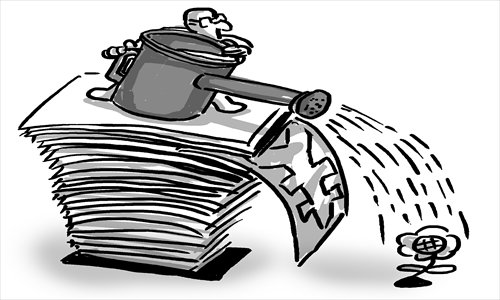HOME >> BUSINESS
Sustainability essential to China’s urban future
By Stephen P. Groff Source:Global Times Published: 2013-10-23 21:38:01

Illustration: Lu Ting/GT
The uncertain global economy has created a volatile environment for policymakers in China. Weak external demand and domestic imbalances pose challenges to economic growth. However, it also creates an opportunity to address structural constraints and allocate resources more efficiently for development needs in the world's second largest economy.
Against this background, China faces high expectations to deliver comprehensive socio-economic reforms that will ensure sustainable growth and help stabilize the global economy. Without equivocation, leaders have indicated their intention to focus on the quality, inclusiveness and sustainability of growth.
To that end, changing the growth pattern toward a more consumption-driven model is a critical element of the government's reform agenda. These changes are essential to rebalance growth and ensure its quality and sustainability. Moreover, environmental protection and resident-benefiting rather than resource-consuming urbanization feature prominently among the leaders' priorities.
Environmental sustainability is also part of China's long-term strategy. Ambitious green targets for low-carbon energy, energy efficiency and clean technology are embedded in the 12th Five-Year Plan. More importantly, the 18th National Congress of the Communist Party of China introduced the concept of "ecological civilization" into the Party's Charter. Coined in 2007 for the first time, ecological civilization is understood as the cornerstone of balancing economic development and environmental sustainability.
Since March this year, the government has reiterated in key pronouncements its commitment to environmental protection to curb escalating costs associated with resource depletion and environmental damage after decades of rapid economic growth. Recently, specific reforms have been added to the green agenda, including plans to develop new pricing mechanisms for natural resources, and setting up a carbon emissions trading scheme through pilot projects.
The leaders have also pointed out that while reductions in energy intensity are often associated with slower economic growth, green growth will offer important economic opportunities and create new jobs. However, capturing the benefits of this transformation requires adjustments in the policy framework.
In this regard, the government has taken commendable steps to make growth more inclusive and sustainable by proposing a shift in focus from the quantity to the quality of growth. This is reflected in the government's determination to lower the country's annual GDP growth target to enhance inclusive and environmentally sustainable growth. Moreover, by setting innovation-driven growth at the core of the new industrial policy, energy efficient products, renewable energy and new technologies will gradually dominate industrial production.
Efforts are being channeled to rebalance the economy by shifting to a growth model more driven by consumption and services. Indeed, a larger services sector will support economic restructuring and the achievement of some of the social and environmental targets set in the 12th Five-Year Plan, in particular employment generation and environmental sustainability.
Services play a major role in improving production efficiency, and promoting technical progress and innovation. In developing economies, the adequate provision of transportation, telecommunications, logistics and financial services, is a prerequisite to ensure and sustain economic growth. Additionally, the carbon footprint of services is significantly smaller than that of manufacturing. Hence, a higher reliance on services will support government efforts toward green growth.
Services in China have expanded rapidly since economic reforms were launched, and in particular since China's accession to the World Trade Organization, but their size appears to be smaller than expected based on the country's per capita income level. This implies that there is room for expansion.
A larger services sector would help to absorb the rural-urban migration stemming from the announced urbanization plans, and reduce the environmental impact of expanding cities. However, greater urbanization should be undertaken under the framework of a low-carbon economy to ensure environmental sustainability, and supported by increased social public expenditure.
While making cities more livable and greener is vital, improving social protection systems for the vulnerable - including those in the informal sector - is also an area in need of urgent attention. We welcome the ongoing reform of the country's household registration system, coupled with the rural land rights system reform. This is a central element to address the challenge of absorbing more than 20 million people moving into cities every year. However, more supporting policies are also needed to reduce migrant households' uncertainty about the cost of healthcare and lack of security in regard to retirement income. For that, further improvement in social protection and a shift in emphasis from coverage to benefits are essential policy actions.
The author is the vice president for East Asia, Southeast Asia and the Pacific at the Asian Development Bank.
bizopinion@globaltimes.com.cn
Posted in: Comments